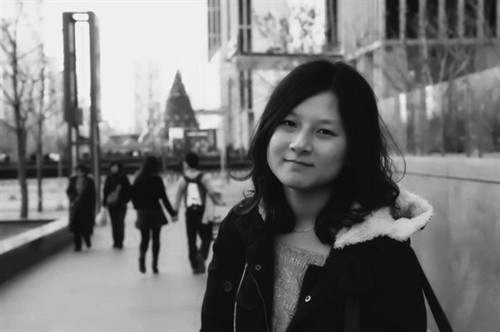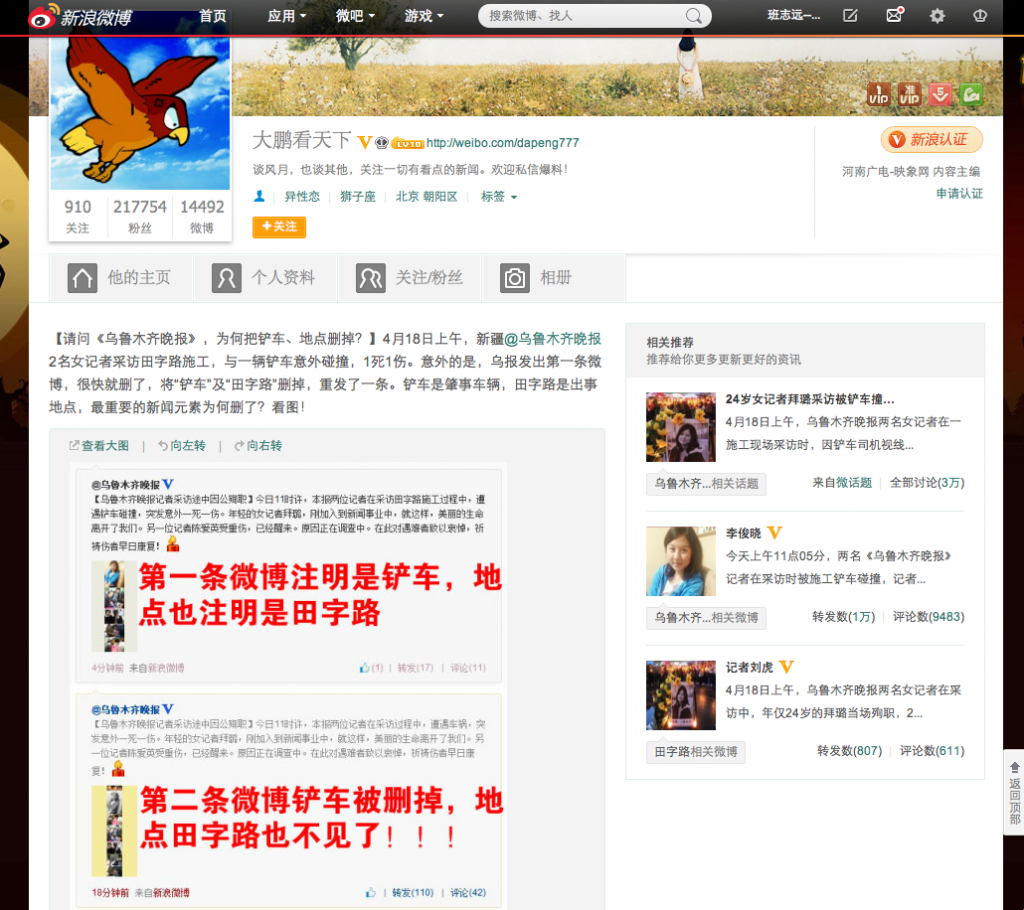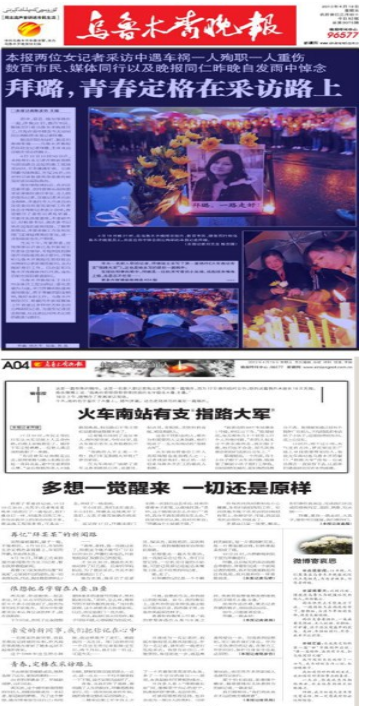One female journalist was killed and a second seriously injured on April 18 after they were struck by a tractor shovel on the worksite of a high-profile infrastructure project in Urumqi, the capital of China’s Xinjiang autonomous region. The tragedy seems to have been an accident, but there are lingering questions about how local media and authorities in Urumqi have handled the story.
The two journalists were reportedly interns for the Urumqi Evening Post, a leading commercial newspaper in the regional capital. They were struck by the tractor shovel shortly after 11am on April 18 while on the worksite of the Tianzi Road Project (田字路工程), an important infrastructure project in Urumqi designed to alleviate serious traffic congestion in the city.

[ABOVE: Urumqi Evening Post intern Bailu was struck and killed by a tractor shovel when reporting on a major construction project on April 18.]
The project’s design is in the shape of the Chinese character “tian” (田), meaning “field,” hence the name “Tianzi Road” (or “field character road”). Phase one of the project has already been completed, and phase two is now underway.
The Tianzi Road Project is an important source of political capital for local Party leaders in Xinjiang and there has been pressure in recent months to complete phase two. On April 16, just two days before the on-site accident, local media reported that work on the project had been accelerated.
One source in Xinjiang, who requested anonymity given the local sensitivity of this story, said many problems had been exposed at the Tianzi Road Project and that the local government had violated normal construction procedures for the sake of “political point scoring” (政府为了政绩违背建设规律一味最求速度). The source also alleged that the Urumqi Evening Post had sent two inexperienced interns to the Tianzi Road Project worksite because it believed they would be more amenable to the propaganda goals of the local leadership.
According to the Xinjiang source, the accident on April 18 happened on a section of the project directly across from Urumqi’s famous bazaar, the “Dabazha.” The source also told CMP that the reporting intern killed in the accident, Bailu (拜璐), belongs to China’s muslim Hui minority.
The priority nature of the infrastructure project and the ethnicity of the intern who was killed both make this a potentially sensitive story for the local leadership.
On the day of the accident the Urumqi Evening Post initially issued a post from its official Weibo account that included the name of the project worksite and the term “tractor shovel.” That post was quickly deleted and replaced with a second post in which both were removed. The omission was spotted by eagle-eyed users on Sina Weibo, who re-posted images of both posts:
[I’d like to ask: Why did the Urumqi Evening Post delete the location, and the word “tractor shovel”?] On the morning of April 18, 2 female journalists from the Urumqi Evening Post were reporting on the Tianzi Road Project when they were accidentally struck by a tractor shovel. One died and the other was injured. What is unforeseen is that the first Weibo sent out by the Urumqi Evening Post was quickly deleted, and the words “tractor shovel” and “Tianzi Road” were removed from a follow-up post. A tractor shovel was the cause of the accident, and the place where it happened was Tianzilu — so why were these most crucial aspects of the news story removed? Look at the following image.

[ABOVE: A composite image showing two posts on the April 18 accident at the Tianzi Road Project, the first mentioning the location and the second removing it.]
Users speculated that the newspaper had removed the reference to the Tianzi Road Project because local leaders did not want to be held liable or have the project tainted by tragedy. The reference to “tractor shovel” might have been removed to avoid associations with forced demolition. In a number of cases across China, villagers have been crushed by machines while trying to defend their homes from forced demolition by the authorities. Social media users did make this association in the comments sections of some posts on the Tianzi Road Project accident.
The August 19 edition of the Urumqi Evening Post also deflected the story of the intern’s death away from the Tianzi Road Project. The paper’s front page carried the story with a photograph of a candlelight vigil held for the victim the night before [A slideshow of the vigil is also available on the paper’s website. But the story’s headline read: “Bailu: Youth Cut Short On The Way To An Interview.” The story suggests that Bailu was killed not at the worksite but on the way to report on the story.

[ABOVE: The August 19 edition of the Urumqi Evening Post runs a front-page story on the death of the paper’s intern, Bailu.]
Social media have played an important role in the unfolding of this story.
One of the first reports on the incident came from Zhou Peng (周鹏), a journalist for the Xinjiang Legal News, who wrote at 1:11pm on April 18: “There’s been an accident on the Dabazha (大巴扎) section of the Tianzilu Project (田字路工程). Two journalists, one dead and one injured.”
A few minutes later he added: “On April 18 at 11:05am, two journalists from the Urumqi Evening Post were struck by a tractor shovel when covering the Dabazha section of the Tianzilu regeneration project. One journalist died on the scene and the other was injured.”
At 2:18pm Zhou Peng further updated the story, encouraging users not to invent conspiracies about the reporter’s death (for example, the suggestion that this was related to forced demolition): “While working the driver of the tractor shovel had line of sight problems and didn’t notice the two reporters, and this resulted in the accident. I ask that everyone not come to careless conclusions.”
Social media have also provided a platform for other journalists to make their feelings known about the case. Mou Min (牟敏), a reporter at Urumqi Evening Post, wrote on Sina Weibo:
If one day something happens to me in the course of reporting a story, the rest of you won’t know where exactly it happened, and how it happened, because you wouldn’t be allowed to know. But there would be people calling on all of you to follow my example, to contribute to the cause of journalism. This is our sorrow. I love doing journalism, but I am filled with sorrow.
Another Urumqi Evening Post reporter, Gao Ting (高婷), wrote:
Working the past three years as a journalist, I’ve put up with curses and hardship and these have toughened me up. But when heard that my colleague was run over by a shovel tractor, I felt the lightness of life for the first time and didn’t know how to calm myself down. After that, when I saw things being done that didn’t have the slightest shred of humanity to them, I could only think about how I hoped my own child would never become a journalist.




















